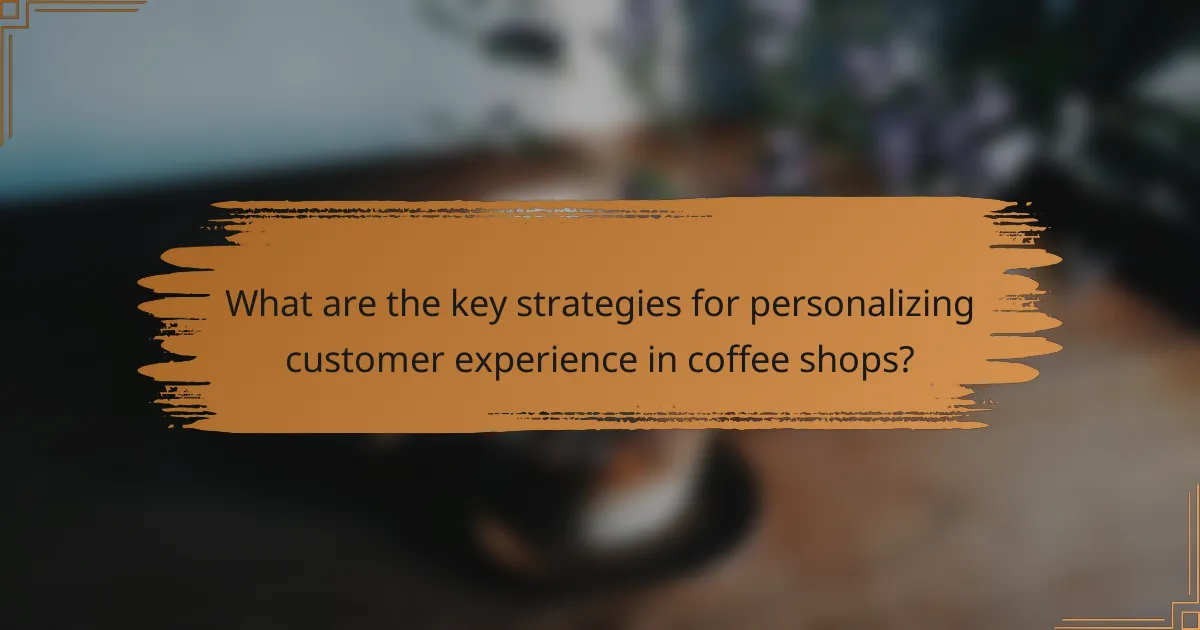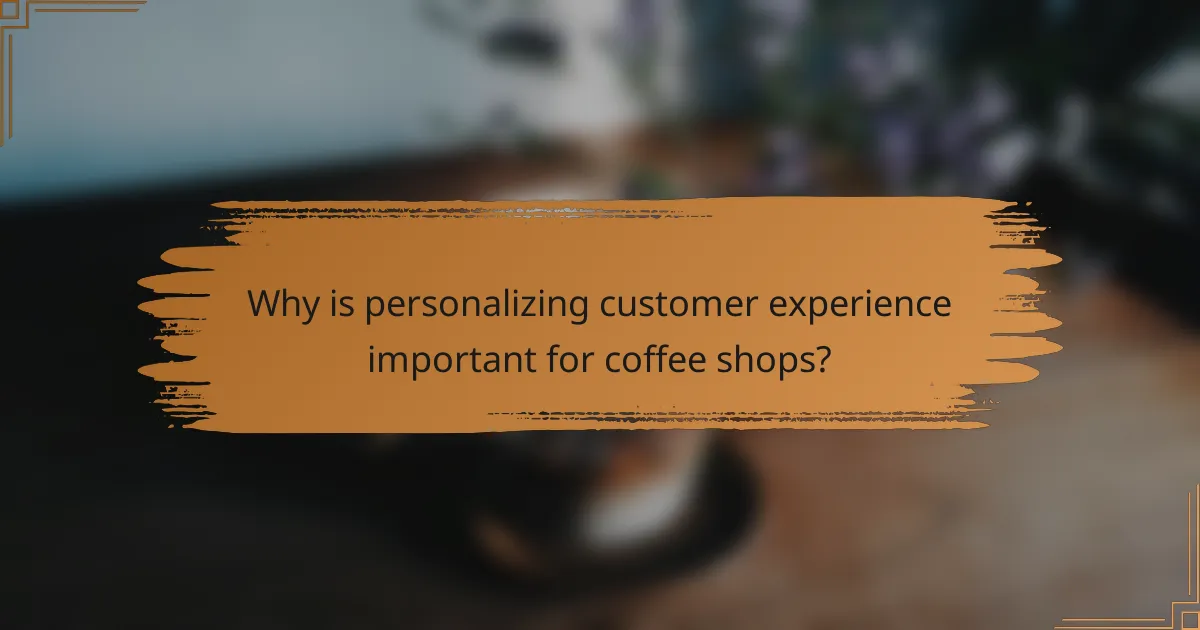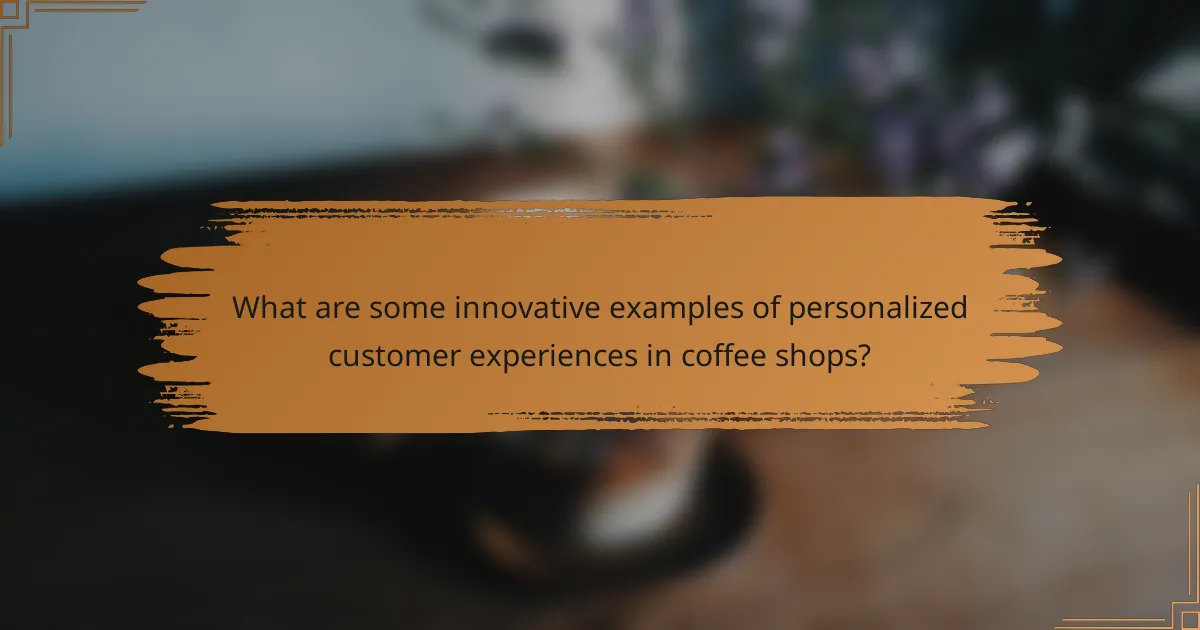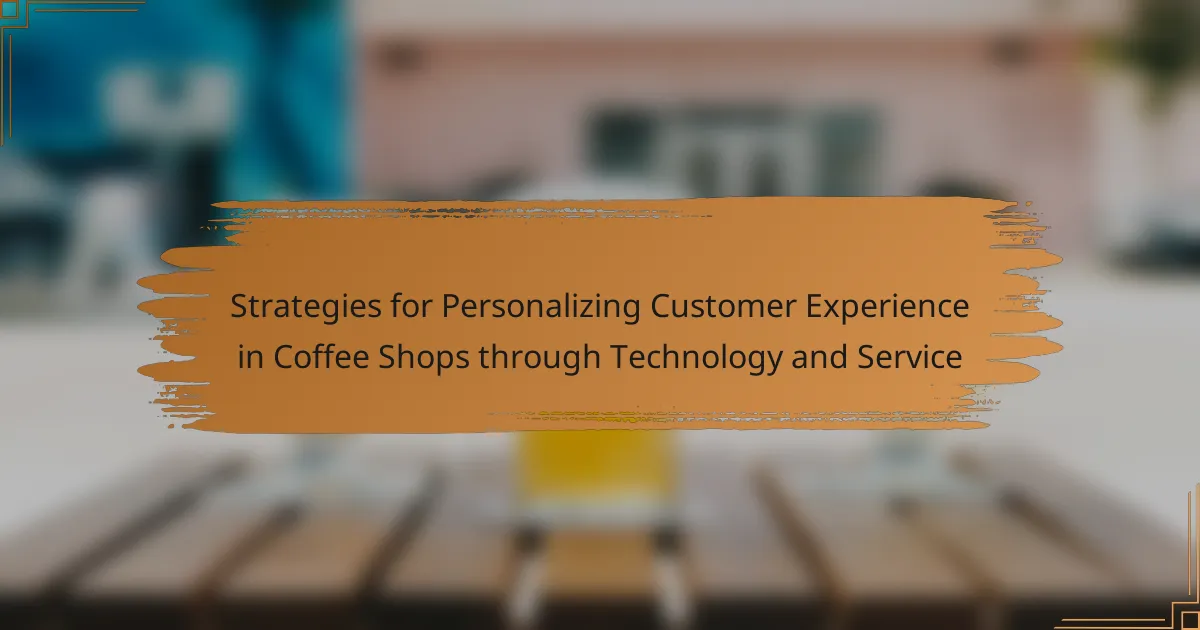
What are the key strategies for personalizing customer experience in coffee shops?
Key strategies for personalizing customer experience in coffee shops include utilizing customer data, offering customized beverages, and enhancing service interactions. Coffee shops can gather customer preferences through loyalty programs and surveys. This data allows them to tailor recommendations and promotions. Offering customizable beverage options lets customers create their ideal drink. Staff training on personalized service can improve customer interactions. For example, remembering regular customers’ names and orders fosters a welcoming atmosphere. Implementing technology like mobile apps can streamline ordering and payment, enhancing convenience. These strategies collectively create a unique experience that encourages customer loyalty.
How can technology enhance customer experience in coffee shops?
Technology enhances customer experience in coffee shops by streamlining service and personalizing interactions. Mobile ordering apps allow customers to place orders ahead of time. This reduces wait times and improves convenience. Digital payment systems facilitate quick transactions, enhancing efficiency. Loyalty programs integrated into apps offer personalized rewards based on purchase history. Smart kiosks can provide customized drink recommendations. Wi-Fi access keeps customers connected, increasing satisfaction. Data analytics help coffee shops understand customer preferences better. This leads to tailored promotions and improved product offerings.
What types of technology are commonly used in coffee shops for personalization?
Coffee shops commonly use customer relationship management (CRM) systems for personalization. CRM systems help track customer preferences and purchase history. This data enables tailored marketing and personalized offers. Mobile apps are also widely used for personalization in coffee shops. These apps allow customers to customize orders and receive rewards. Additionally, point-of-sale (POS) systems facilitate personalized service by storing customer data. Digital menu boards can display personalized recommendations based on previous orders. Social media integration helps coffee shops engage customers with targeted promotions. Overall, these technologies enhance the customer experience by providing personalized interactions.
How does data analytics contribute to understanding customer preferences?
Data analytics contributes to understanding customer preferences by analyzing purchasing behavior and feedback. It identifies patterns in customer choices over time. For instance, coffee shops can track which drinks are popular among different demographics. This data allows for targeted marketing strategies. Additionally, analytics can reveal seasonal trends that influence customer preferences. According to a report by McKinsey, businesses using data analytics can improve customer satisfaction by 10-15%. This improvement is achieved through personalized recommendations based on individual purchase histories. Overall, data analytics provides actionable insights that enhance customer experience in coffee shops.
What role does customer service play in personalizing experience?
Customer service plays a crucial role in personalizing the customer experience. It allows businesses to understand individual customer preferences and needs. Through effective communication, customer service representatives can gather specific information about customers. This information enables tailored recommendations and solutions. For instance, knowing a customer’s favorite drink can lead to personalized offers. Studies show that personalized experiences increase customer satisfaction and loyalty. According to a report by Salesforce, 70% of consumers say a company’s understanding of their personal needs influences their loyalty. Therefore, exceptional customer service directly enhances the personalization of the customer experience.
How can staff training improve customer interactions?
Staff training can significantly enhance customer interactions by equipping employees with essential skills and knowledge. Trained staff can communicate effectively, leading to clearer and more positive interactions. They become adept at understanding customer needs, which fosters a personalized experience. This understanding can increase customer satisfaction and loyalty.
Research shows that businesses with well-trained staff see a 10% increase in customer retention rates. Training also helps staff handle complaints more effectively, turning negative experiences into positive outcomes. Overall, effective staff training leads to improved service quality and a better customer experience.
What are the best practices for creating a welcoming atmosphere?
Creating a welcoming atmosphere involves several best practices. First, ensure a clean and organized space. Cleanliness enhances comfort and makes customers feel valued. Second, use warm lighting to create an inviting ambiance. Studies show that soft lighting can improve mood and encourage longer visits. Third, play soft background music to enhance the overall experience. Research indicates that music can influence customer behavior positively. Fourth, train staff to greet customers warmly and engage in friendly conversation. Friendly interactions foster a sense of belonging. Fifth, provide comfortable seating arrangements. Comfortable seating encourages customers to relax and stay longer. Lastly, incorporate personal touches, such as local artwork or community boards, to connect with customers. Personalization can significantly enhance customer loyalty and satisfaction.

Why is personalizing customer experience important for coffee shops?
Personalizing customer experience is crucial for coffee shops because it enhances customer satisfaction and loyalty. Tailored interactions make customers feel valued and understood. A study by Deloitte found that 80% of consumers are more likely to make a purchase when brands offer personalized experiences. Personalization can include remembering customer preferences and suggesting tailored products. This approach increases repeat visits and boosts sales. Additionally, personalized experiences can lead to positive word-of-mouth referrals. In a competitive market, differentiation through personalization can significantly impact a coffee shop’s success.
What benefits do personalized experiences offer to coffee shop owners?
Personalized experiences offer several benefits to coffee shop owners. They enhance customer loyalty by making patrons feel valued and understood. Personalized interactions can lead to increased sales, as customers are more likely to purchase items tailored to their preferences. Data-driven insights allow owners to optimize their menu offerings based on customer behavior. This approach can also improve customer retention rates, as personalized service encourages repeat visits. Research indicates that 80% of consumers are more likely to make a purchase when brands offer personalized experiences. Additionally, personalized marketing efforts can result in higher engagement rates, further boosting revenue. Overall, these experiences create a competitive edge in a crowded market.
How does personalization affect customer loyalty and retention?
Personalization significantly enhances customer loyalty and retention. It creates tailored experiences that resonate with individual preferences. When customers feel understood, they are more likely to return. A study by Epsilon found that 80% of consumers prefer personalized experiences. Additionally, personalized communication can increase engagement rates. This leads to higher customer satisfaction and repeat purchases. Brands that implement effective personalization strategies often see improved customer lifetime value. Personalization fosters emotional connections, encouraging customers to choose a brand over competitors.
What impact does a personalized experience have on sales and revenue?
A personalized experience significantly boosts sales and revenue. Personalized interactions increase customer satisfaction and loyalty. When customers feel valued, they are more likely to make repeat purchases. Research shows that 80% of consumers are more inclined to buy from brands that provide personalized experiences. Additionally, personalized recommendations can lead to higher average order values. For instance, companies utilizing personalized marketing strategies report revenue increases of up to 20%. This demonstrates that tailoring experiences to individual preferences directly impacts financial performance.
How can coffee shops leverage customer feedback for personalization?
Coffee shops can leverage customer feedback for personalization by analyzing data from reviews and surveys. This feedback helps identify customer preferences and trends. For instance, if many customers request dairy-free options, the shop can introduce more alternatives. Additionally, feedback can guide menu adjustments based on seasonal preferences. Implementing a loyalty program that rewards feedback can encourage more responses. According to a study by Deloitte, 62% of consumers expect personalized experiences. By using this data, coffee shops can enhance customer satisfaction and retention.
What methods can be used to gather customer feedback effectively?
Surveys are a highly effective method to gather customer feedback. They can be conducted online or in-person. Online surveys allow for broader reach and convenience. In-person surveys can provide immediate responses and engagement. Another method is feedback kiosks placed in-store. These kiosks encourage customers to share their thoughts right after their experience. Social media platforms also serve as valuable feedback channels. Customers often share their opinions and experiences on these platforms. Additionally, direct interviews can yield in-depth insights. They allow for open-ended questions and detailed discussions. Finally, monitoring online reviews can provide qualitative feedback. This method helps identify trends and areas for improvement.
How can feedback be integrated into service and technology improvements?
Feedback can be integrated into service and technology improvements through systematic collection and analysis. Coffee shops can implement customer surveys to gather insights on service quality. Utilizing digital platforms allows for real-time feedback during customer interactions. Analyzing this feedback helps identify common pain points in service delivery. Technology can be adjusted based on customer preferences and suggestions. For example, if customers request faster service, coffee shops can optimize staff schedules or streamline ordering processes. Regularly reviewing feedback ensures continuous improvement and adaptation to customer needs. This approach aligns with a study by the Journal of Service Management, which indicates that customer feedback significantly enhances service quality and satisfaction.

What are some innovative examples of personalized customer experiences in coffee shops?
Innovative examples of personalized customer experiences in coffee shops include customized drink recommendations based on past purchases. Many coffee shops use loyalty apps to track customer preferences. These apps suggest drinks tailored to individual tastes. Another example is barista training in customer interaction. Trained baristas engage with customers to learn their preferences directly. Additionally, some shops offer personalized cups with customers’ names or messages. This small touch enhances the overall experience. Technology also plays a role, such as using AI to analyze customer data for personalized marketing. These strategies lead to increased customer satisfaction and loyalty.
How are successful coffee shops implementing personalization strategies?
Successful coffee shops are implementing personalization strategies by utilizing customer data and technology. They collect data through loyalty programs and mobile apps. This data helps them understand customer preferences and purchase history. Based on this information, they offer personalized recommendations. For example, customers may receive tailored discounts or promotions on their favorite drinks. Additionally, baristas are trained to remember regular customers’ names and orders. This creates a welcoming environment that enhances customer loyalty. Research indicates that personalized experiences can increase customer satisfaction by 20%.
What unique approaches are being used in different coffee shop chains?
Different coffee shop chains are employing unique approaches to enhance customer experience. Starbucks utilizes a mobile app for ordering and rewards. This app allows customers to customize drinks and earn points for purchases. Dunkin’ offers a drive-thru experience focused on speed and convenience. Their mobile order feature reduces wait times. Peet’s Coffee emphasizes quality through artisanal brewing methods. They provide educational workshops to engage customers. Blue Bottle Coffee focuses on freshness with single-origin beans. They also offer subscription services for home delivery. Each chain’s strategy reflects a commitment to personalized service and customer satisfaction.
How do local coffee shops compete with larger chains through personalization?
Local coffee shops compete with larger chains through personalization by creating tailored customer experiences. They build relationships with customers by remembering their names and preferences. This personal touch fosters loyalty and encourages repeat visits. Local shops often curate unique menus that reflect community tastes. They may also offer customized drink options that larger chains do not provide. Furthermore, local coffee shops often engage with customers through social media, promoting a sense of community. This direct interaction allows for feedback and adaptation to customer desires. Research shows that personalized experiences can increase customer satisfaction and retention. By focusing on these personalized strategies, local coffee shops differentiate themselves from larger competitors.
What are the challenges in personalizing customer experience in coffee shops?
Personalizing customer experience in coffee shops faces several challenges. One major challenge is data collection. Many coffee shops lack the technology to gather customer preferences effectively. This leads to insufficient data for tailoring experiences. Another challenge is staff training. Employees may not have the skills to engage with customers on a personal level. This can hinder the implementation of personalized service. Additionally, resource limitations can restrict investment in personalization technologies. Small coffee shops, in particular, may struggle with budget constraints. Finally, maintaining consistency in personalized service can be difficult. Variability in staff performance can lead to inconsistent customer experiences.
What common obstacles do coffee shops face in implementing technology?
Coffee shops face several common obstacles in implementing technology. One major challenge is the high initial cost of technology investments. Many coffee shops operate on tight budgets, making it difficult to afford new systems. Additionally, staff training is often required for effective technology use. This can lead to increased labor costs and time away from customer service.
Another obstacle is resistance to change among employees. Some staff may be uncomfortable with new technology, leading to decreased morale and productivity. Furthermore, integration with existing systems can be complex. Coffee shops often use multiple software platforms, making it hard to streamline operations.
Lastly, maintaining technology can be challenging. Regular updates and troubleshooting are necessary to keep systems running smoothly. This can strain resources in smaller coffee shops. These obstacles can hinder the successful adoption of technology in coffee shops.
How can coffee shops overcome service-related challenges in personalization?
Coffee shops can overcome service-related challenges in personalization by implementing customer relationship management (CRM) systems. These systems collect and analyze customer data to tailor experiences. Staff training is crucial for understanding individual preferences. Personalized recommendations can enhance customer satisfaction and loyalty. Utilizing mobile apps allows for customized orders and promotions. Regular feedback mechanisms can identify service gaps and improve personalization. Data analytics can help in predicting trends and preferences. This approach has been shown to increase customer retention by up to 30%.
What practical tips can coffee shops use to enhance customer experience through personalization?
Coffee shops can enhance customer experience through personalization by implementing loyalty programs. These programs reward frequent customers, fostering a sense of belonging. Personalized recommendations based on previous orders can also improve satisfaction. Utilizing customer data helps baristas suggest drinks tailored to individual preferences.
Offering customizable drink options allows customers to create their ideal beverage. Engaging with customers through targeted emails can inform them about new products or promotions. Training staff to remember regular customers’ names and preferences creates a welcoming atmosphere.
Using technology, such as apps for pre-ordering, can streamline the experience. Personalized messages within these apps can make customers feel valued. These strategies collectively enhance customer loyalty and satisfaction in coffee shops.
The main entity of this article is the personalization of customer experience in coffee shops, focusing on strategies that leverage technology and service enhancements. Key topics include the use of customer data for tailored recommendations, the role of technology such as mobile apps and CRM systems in streamlining service, and the importance of staff training in fostering personalized interactions. The article also explores the benefits of personalized experiences for customer loyalty and retention, as well as practical tips for coffee shops to implement effective personalization strategies. Overall, it highlights the impact of personalization on customer satisfaction and business success in the competitive coffee shop market.



